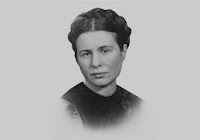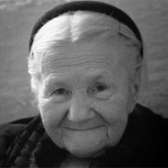 |
| Public Domain |
Born on February 15, 1910, to a physician father and housewife mother, Irena Stanislawa Sendler grew up in Otwock, a town about fifteen miles southeast of Warsaw that included a large Jewish community. Her father treated the very poor, including the Jews, free of charge. Unfortunately, when she was only seven years old, he died of typhus, contracted from one of his patients. The community embraced Irena and her mother, offering financial assistance, however, the widow Janina declined their help.
Irena headed to college at the University of Warsaw where she studied law, however, she dropped out after two years. Vehemently opposed to the “ghetto bench system,” a form of official segregation in the seating of university students that required Jewish students to sit or stand in certain sections of the lecture halls reserved for them, Irena was subjected to academic discipline for her activities. She developed a reputation as a communist and “philo-Semite,” literally Jew-lover or Jew-friend, and was refused employment by the Warsaw school system because of her leanings.
In 1931, she married Mieczyslaw Sendler, but the marriage would not last. She soon found the illegal Communist Party of Poland and the Free Polish University where she belonged to a group of social workers. Sometime in the early 1930s, she was able to obtain work at a legal counseling and social help clinic, the Section for Mother and Child Assistance at the Citizen Committee for Helping the Unemployed (quite a mouthful).
After the German invasion in 1939, persecution of the Jewish people began. Authorities removed Jews
 |
| Public Domain |
By October 1941, giving assistance to Jews was punishable by death, and not just for the person providing help, but also for their entire family. However, Irena and her friends continued their work. In July 1942, when ghetto inhabitants began to be rounded up for “resettlement,” the group knew lives were at stake, so they began to smuggle out babies and children, by leading them out through the underground corridors of the courthouse and through a tram depot, sedating infants and carrying them out in potato sacks or coffins, and suing a church located at the edge of the ghetto that had two entrances, one inside the ghetto and one on the Christian side of Warsaw. The children entered the church as Jews and exited as “Christians.” The escapees were then found places to hide, sometimes with Catholic families, but also in convents, hospitals, and orphanages.
The Germans discovered Irena’s activities, and she was arrested on October 20, 1943. Despite being tortured and beaten, Irena refused to betray her comrades or the rescued children. A month later, she was sentenced to death and taken to another location where she was to be executed. However, the guards escorting her were bribed, and one of them indicated she needed to be taken for “additional interrogation.” Once outside, he shouted for her to run. Successful in escaping, she continued her work undercover through the remainder of the war. Afterward, the jars she’d buried beneath an apple tree in her neighbor’s yard were dug up. Jars that contained the identities in code of the 2,500 children she’d saved by changing their names and given to adoptive families.
 |
| Public Domain |
Irena didn’t consider herself a hero, remarking late in life, “Every child saved with my help is justification of my existence on this Earth and not a title to glory.” In 1965 the Yad Vashem organization in Jerusalem awarded her with the title Righteous Among the Nations and made her an honorary citizen of Israel.
Irena passed away on May 12, 2008, at the age of 98.
___________________
Francine’s Foibles:
She's given up hope. He never had any. Will they find it together?
World War II is finally over, and America is extra grateful as the country approaches this year’s Thanksgiving. But for Francine life hasn’t changed. Despite working at Fort Meade processing the paperwork for the thousands of men who have returned home, she’s still lonely and very single. Is she destined for spinsterhood?
Grateful that his parents anglicized the family surname after emigrating to the United States after the Great War, first-generation German-American Ray Fisher has done all he can to hide his heritage. He managed to make it through this second “war to end all wars,” but what American woman would want to marry into a German family. Must he leave the country to find wedded bliss?
Purchase link:https://amzn.to/3Z4cz0y
Linda Shenton Matchett writes about ordinary people who did extraordinary things in days gone by. A native of Baltimore, Maryland, she was born a stone’s throw from Fort McHenry (of Star-Spangled Banner fame) and has lived in historical places all her life. She now lives in central New Hampshire where she is a volunteer docent and archivist at the Wright Museum of WWII.




Thank you for posting this account of a most remarkable woman. Lord, grant me one speck of her bravery!
ReplyDelete